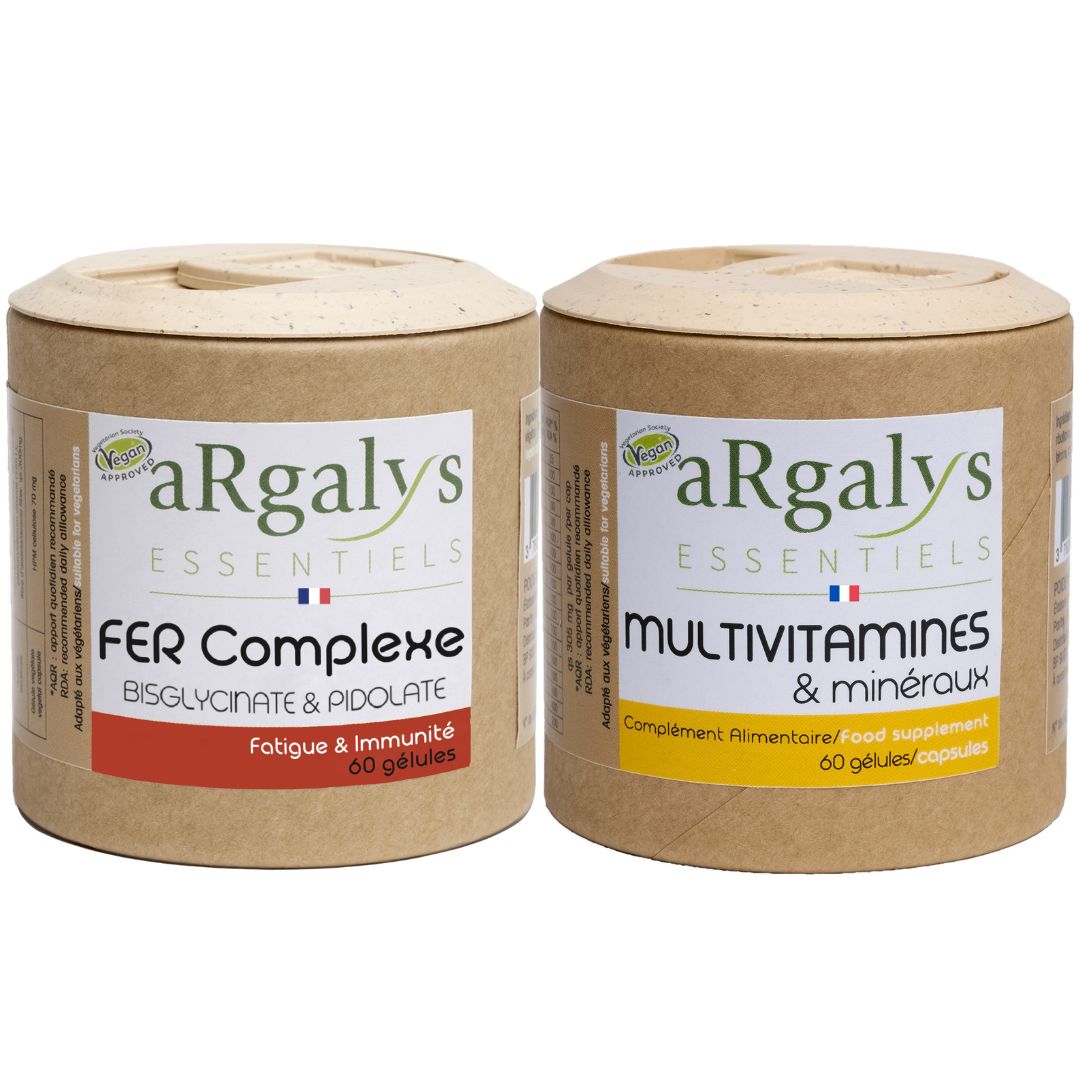
Sports package
- The Multivitamins and Minerals provides 17 nutrients including magnesium
- vitamin B6 and vitamin D3
- Iron
- ideal for muscle oxygenation.
Whether you are an experienced or occasional athlete, diet is the key to having good recovery or one adapted support during exercise.
Our sports pack is the ideal ally for your performance and will allow you to have daily intake of essential vitamins and minerals . It is suitable for women and men, regardless of the sporting activity followed.
✔ The Multivitamin and mineral provides 17 nutrients including magnesium , vitamin B6 and some vitamin D3.
✔ Iron, ideal for muscle oxygenation.
Ingredients
Vitamin C
Vitamin C, present in our formula, is a powerful antioxidant that strengthens the immune system, helps fight oxidative stress, and supports collagen production for healthy skin, bones, and joints. It also plays a key role in iron absorption, helping to reduce fatigue and maintain optimal energy levels.
Magnesium Bisglycinate
It is an essential mineral for the proper functioning of the body. It contributes to the neuromuscular transmission of nerve impulses and plays a key role in many enzymatic reactions. Combined with vitamin D, it helps prevent osteoporosis by promoting bone health. In addition, magnesium helps reduce the symptoms of fatigue, providing daily energy support.
In our Multivitamin, magnesium is in the form of bisglycinate, offering optimized absorption and better digestive tolerance compared to other forms of magnesium. The presence of glycine, an amino acid, also promotes the formation of collagen, essential for the health of connective tissues and skin.
Vitamin B12
Absent from plant foods, this vitamin must absolutely be provided as a supplement.
It plays a fundamental role in the synthesis of body proteins and in the functioning of the brain and nervous system.
Sub-deficiencies in adults result in states of fatigue and nervous fragility.
For young people, pregnant women and seniors, it is not advisable to skip vitamin B12 supplementation equivalent to 100% of the daily requirement (adult RI). Consumer studies (Oxford-Epic, University of Brussels) show that vegans are significantly deficient in vitamin B12.
Vitamin D3
Essential for bone fixation, calcium is of non-animal origin.
A systematic intake guarantees good ossification, particularly when calcium intake is limited, in winter (exposure to the sun allows the body to synthesize vitamin D), and for sensitive populations (young people, seniors, pregnant women).
Vitamin A
The beneficial effects of vitamin A are numerous at appropriate dosages. It is essential for the proper functioning of vision and gene expression, particularly for all mechanisms of development and cell renewal from the fertilization of the embryo until the end of life. The molecular form of vitamin A is retinol (found in animal tissues: example: calf liver), however there are plant sources of provitamin A: carotenes, and mainly Beta Carotene. Beta carotene differs from retinol by two important properties: its antioxidant power (anti-free radicals) and its absence of risk during pregnancy.
Other vitamins
(E, K1 for fat-soluble, B1, B3, B5, B6, H for water-soluble) are provided safely because it is difficult to know the actual use of vitamins present in food.
Either because they are degraded by the food preparation process (cooking in particular).
Either because their actual absorption in the intestine is low and variable (and linked to the presence of certain other parameters: lipids, enzymes, intestinal flora).
Except for vitamin B12, the storage of water-soluble vitamins in the body is low, so it is important to have a guaranteed daily intake. When the recommended dose is reached (one capsule/day), there is no risk of hypervitaminosis.
Trace elements
Iodine, Selenium, Molybdenum and Zinc are trace elements present in many enzymatic reactions. Provided for safety reasons for sensitive profiles (young people, seniors, pregnant women), they do not represent any risk of overdose or renal fatigue at the recommended dose.
Iron
Iron is a trace element essential to the body because it cannot synthesize it.
Iron plays an essential role in the body's oxygenation: it is the transporter of oxygen in the blood to all organs. It is also involved in numerous enzymatic processes and also participates in energy metabolism, the proper formation of red blood cells and cell division.
Any lack of iron results in a reduced capacity for exercise by limiting the supply of oxygen to the organs involved.
 04 74 03 98 80
04 74 03 98 80









